Collaborative, Participatory & Empowerment Evaluation
Asset Framing and Ethical Storytelling: A Practical Workshop to Advance Equity through Inclusive Narrative
-
PB
Pamela Bruno, MPH
Senior Research Associate
Center for Excellence in Public Health, University of New England, United States -

Colleen Fuller, MPH (she/her/hers)
Research Associate
Center for Excellence in Public Health, University of New England
Portland, Maine, United States -

Carrie Draper, MSW (she/her/hers)
Senior Research Associate
Department of Health Promotion, Education, and Behavior, University of South Carolina, United States -
KK
Kimberly Keller, PhD
Associate Extension Professor
Department of Health Sciences, University of Missouri, United States -

Chanta'l Rose, MAS (she/they)
Planning & Evaluation Lead
UNC Chapel Hill, Food, Fitness, and Opportunity Research Collaborative, United States -
KB
Kate Balestracci, PhD, RD
Program Manager and co-PI SNAP-Ed, Program Manager and co-PI CYFAR, Program Assistant Manager EFNEP
University of Rhode Island, United States -
SM
Sarah Misyak, PhD, MPH
Assistant Director and Program Manager for Research and Evaluation
irginia Cooperative Extension Family Nutrition Program, Virginia Tech, United States -
NY
Nick Younginer, PhD
Research Assistant Professor and Co-Investigator SC SNAP-Ed Evaluation
Arnold School of Public Health, University of South Carolina, United States
Presenter(s)
Author(s)
Location: White River Ballroom B
Abstract Information: In this skill-building workshop, presenters will share the key principles of asset framing and ethical storytelling. The workshop will emphasize practical ways to incorporate these principles into all aspects of program implementation, evaluation, and reporting so that the narratives we tell are accurate, aspirational, and respect the dignity of our communities. Attendees will learn approaches to setting research questions, engaging with partners, and telling the story of their data in ways that reinforce principles of inclusion and equity. Experienced practitioners will discuss how to design evaluation questions that lift up community voice and how to connect disparities and community-wide problems to systemic causes, transforming harmful narratives and reducing stigma. The workshop will emphasize practical ways to prioritize and release power to the storyteller, understand positionality, and ensure continuous informed consent. During the workshop, presenters will provide asset-framing and ethical storytelling resources and lead a skill-building exercise for attendees to practice applying the concepts in a supportive group setting. Attendees will examine deficit-framed dissemination examples from the field and participate in a collaborative exercise to critique and improve them. Reflection questions will further individual learning on how to modify evaluation narrative approaches, with opportunities to share out for collaborative learning. Presenters will distribute storytelling and infographic-style templates that can be customized to broadly apply these concepts across a diversity of programs, funding, and topic areas. Workshop attendees will leave with practical skills and tools that can be applied to their own evaluation approaches, enhancing the quality and credibility of program findings.
Relevance Statement: “ Asset-Framing is a narrative model that defines people by their assets and aspirations before noting the challenges and deficits. This model invests in people for their continued benefit to society.” - Trabian Shorters, https://trabianshorters.com/, Accessed 3/13/23 Evaluation practices should promote inclusion and reduce stigma. This is especially relevant to data sharing and storytelling. Words and narratives prime the way we think about people. With the more prevailing deficit-framing approaches, our brains begin to match negative qualities to certain individuals in a group, perpetuating stigmatization. Asset framing shifts the stories we are telling from problem-centered to person- and strength-centered; demonstrating the value of people’s lived experiences. Evaluation approaches have the potential to shift thinking, and as Trabian Shorters of BMe says, it allows you to ”... engage people from a more aspirational lens, a more inspirational lens, and actually a more accurate lens.” (BME, https://bmecommunity.org/, Accessed 3/13/23). In this asset framing and ethical storytelling workshop, presenters will review asset-framing and ethical storytelling approaches and provide recommended resources to apply these practices to evaluation data narratives (University of Tennessee Extension, Ethical Storytelling, https://extension.tennessee.edu/publications/Documents/W1078.pdf, Accessed 3/13/23). To be most effective, practices must be integrated into program planning and evaluation design and reflected through ongoing community engagement. Presenters will share practical ways to incorporate asset framing and ethical storytelling into all aspects of program implementation so that the narratives we tell are aspirational and convincing. Attendees will hear practical approaches to setting research questions, engaging with partners, and telling the story of their data in ways that reinforce principles of inclusion and equity. The presenters, experienced evaluators participating in a national evaluation community of practice for the Supplemental Nutrition Assistance Program - Education or SNAP-Ed, will share their own experiences advancing equity through data narratives. Attendees will hear from these practitioners on how to connect disparities and community wide problems to systemic causes and how to design evaluation questions that lift up community voice. In alignment with the key principles of asset framing and ethical storytelling, the workshop will emphasize practical ways to prioritize and release power to the storyteller, understand positionality, and ensure continuous informed consent. During the workshop, attendees will examine deficit-framed dissemination examples from the presenters’ own experiences and will participate in a collaborative exercise to critique them. As a skill-building exercise, attendees will then practice asset framing and ethical storytelling in a supportive group setting, applying the principles shared to revise the data narratives. Reflection questions designed to further attendee thinking on how they could modify their own evaluation approaches will guide individual learning, with opportunities to share out for collaborative learning. Presenters will share storytelling and infographic-style templates that can be modified to apply these concepts to the field of evaluation dissemination, filling a gap for practical resources applicable across a diversity of programs, funding, and topic areas. Workshop attendees will leave with practical skills that can be applied immediately to support inclusive communication and equitable evaluation practices.
